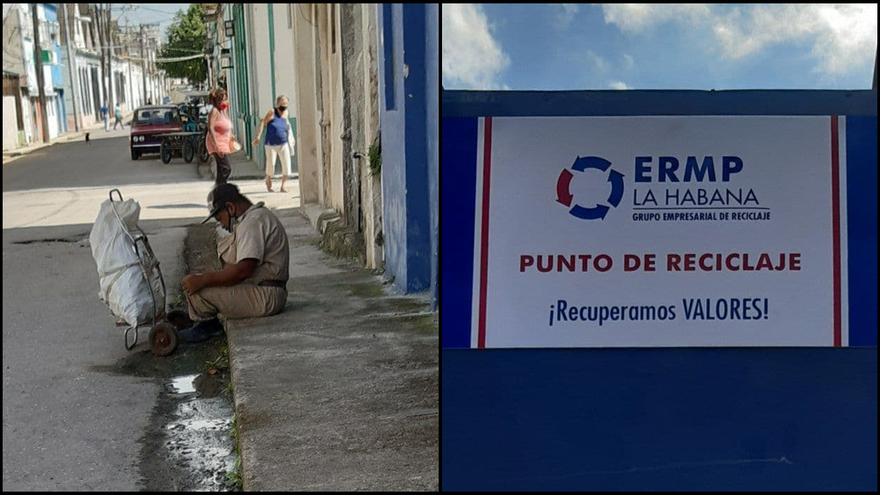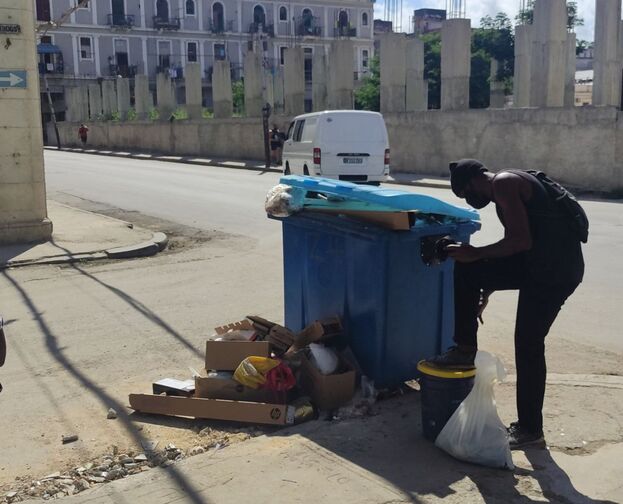
![]() 14ymedio, Natalia López Moya, Havana, 4 November 2021 — Havana does not have money for recycling. The capital’s Raw Materials Recovery company asserts that the cash has not been deposited in the bank and that it cannot pay the recyclers, who day by day roam the streets in search, mainly, of plastic, aluminum, iron, cardboard and bottles.
14ymedio, Natalia López Moya, Havana, 4 November 2021 — Havana does not have money for recycling. The capital’s Raw Materials Recovery company asserts that the cash has not been deposited in the bank and that it cannot pay the recyclers, who day by day roam the streets in search, mainly, of plastic, aluminum, iron, cardboard and bottles.
“What will come here when there’s silver will be tremendous. Over 15 days of people collecting and unable to be paid” says Germán, a retiree who this week tried to sell a bag with several glass bottles collection point at Benjumeda and Retiro, in Centro Habana.
Germán receives a pension of 1,700 pesos each month, with which he barely manages to buy food for two weeks. These days he has survived with the sale to individuals of bottles of rum and beer, mostly, which are reused by mini-industries to pack tomato puree, garlic paste, Creole mojito and other sauces.
There is also business with bars and restaurants, good clients of the collectors, since the state businesses where they buy beer require them to deliver two empty bottles for one full.
“It is not like before, when there were many people looking for life like this,” explains Germán. “People look for something else, it is better to be a colero [a person who stands in line for others] than to live off this, everything is expensive,” he says discouraged. Some of the recycling collectors that remain in Centro Habana come to Benjumeda to sell the few cardboard boxes and plastic bottles that they managed to collect, but they only find the door of the recycling point closed and the poster with the slogan of the company: “We recover values.”
The collector trade is legalized as self-employment. In 2019, of the half a million licenses to practice private work, some 5,000 were for the collection of raw materials that the State repurchases in the more than 300 centers it has in the country. Waste collectors must pay around 30 pesos a month for their license, in addition to Social Security taxes.
But there are also the workers who operate without any authorization, as an extra job and sell directly to individuals. They see the garbage on the street, collect it and put it discreetly in a small bag.
Luis Carlos, 44, a resident of Cerro, in a barracks near Manila Park, made a living until about two years ago by picking up soda and beer cans from the trash. “I even invented a way to crush them without going through so much work and made good money, but now you can hardly make a living from that,” he says.

“Many of the products that came in cans have disappeared. They sell a little bit more in stores when they appear, or now they come in plastic jars or glass bottles,” he says. “Finding a can of soda in the garbage now is complicated because there is very little supply, and the families that could buy that product before, no longer have enough money for that.”
Added to the shortage of raw materials are the warning letters from police and inspectors that have now increased due to the “spread of epidemics…Then the fines come and you can even go to prison for a year,” says Germán.
With the business downturn, recyclers like Luis Carlos have decided to search for plastic bottles. The farmers buy them to pack the yogurt they sell, but it is not that they find a lot of them and a lot of work is spent stomping around Havana to look for them.”
His hope is that with the reopening to tourism, on November 15, there will be more cans in the trash and the business will make sense again. “But whether or not, I’ve turned to threading plastic pipes and galvanized pipes because I can no longer live on the cans,” he explains.
The failure to pay the sellers of raw materials is not exclusive to Havana. “You arrived after weeks of work and solving the transport problem to carry the bags of cans or bottles, and the place for weighing and buying raw materials was closed, or they were not collecting due to lack of money and people began to stop going,” Niurka Primelles from Ciego de Ávila explains to this newspaper.
“My husband and I bought from the collectors, packed the cans and other metal waste and took them to sell. The recycling business helped us finish our little house and we lived without luxuries but without problems,” she recalls now. “One day we left a large lot that they never paid us for, every time we went they gave us evasions and that is not possible.”
“There was a lot of misinformation and the listings of places that buy them were not accurate, one day you would arrive and they would tell you that they were only buying ferrous materials and the next that they were only buying cardboard or bottles. The purchasing was unstable and that caused many to stop collecting because they could not guarantee that the State would buy the product from them.”
Now the family sells spices such as cumin, oregano and bay leaves that they buy in bulk and pack in small envelopes that are sealed with a small sealer they invented. “We want to go back to the recycling business but we will have to wait because here they have not been buying raw materials for a long time.”
____________
COLLABORATE WITH OUR WORK: The 14ymedio team is committed to practicing serious journalism that reflects Cuba’s reality in all its depth. Thank you for joining us on this long journey. We invite you to continue supporting us by becoming a member of 14ymedio now. Together we can continue transforming journalism in Cuba.
